An infomercial is a form of television commercial that resembles regular TV programming yet is intended to promote or sell a product, service or idea. It generally includes a toll-free telephone number or website. Most often used as a form of direct response television (DRTV), they are often program-length commercials, and are typically 28:30 or 58:30 minutes in length. Infomercials are also known as paid programming. This phenomenon started in the United States, where infomercials were typically shown overnight, outside peak prime time hours for commercial broadcasters. Some television stations chose to air infomercials as an alternative to the former practice of signing off, while other channels air infomercials 24 hours a day. Some stations also choose to air infomercials during the daytime hours, mostly on weekends, to fill in for unscheduled network or syndicated programming. By 2009, most infomercial spending in the U.S. occurred outside of the traditional overnight hours. Stations in most countries around the world have instituted similar media structures. The infomercial industry is worth over $200 billion.
Robert Tilton is an American televangelist and the former pastor of the Word of Faith Family Church in Farmers Branch, Texas, a suburb of Dallas. At his ministry's peak in 1991, Tilton's infomercial-style program, Success-N-Life, aired in all 235 American television markets and brought in nearly $80 million per year; it was described as "the fastest growing television ministry in America."
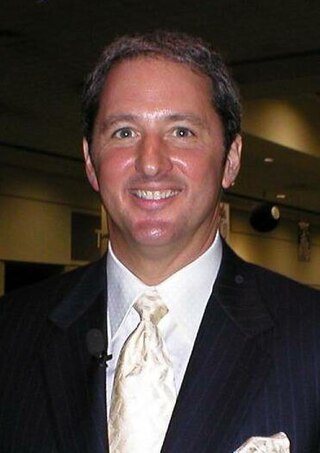
Kevin Trudeau is an American author, salesman, and television personality known for promotion of his books and resulting legal cases involving the US Federal Trade Commission. His ubiquitous late-night infomercials, which promoted unsubstantiated health, diet, and financial advice, earned him a fortune but resulted in civil and criminal penalties for fraud, larceny, and contempt of court.
WPXW-TV is a television station licensed to Manassas, Virginia, United States, broadcasting the Ion Television network to the Washington, D.C. area. The station is owned by the Ion Media subsidiary of the E. W. Scripps Company, and maintains business offices in Fairfax Station, Virginia; its transmitter is located on River Road in Bethesda, Maryland. The Ion network is also broadcast in the region from WWPX-TV in Martinsburg, West Virginia, which shares the same subchannels as WPXW-TV, and on a subchannel of Scripps-owned ABC affiliate WMAR-TV in Baltimore.
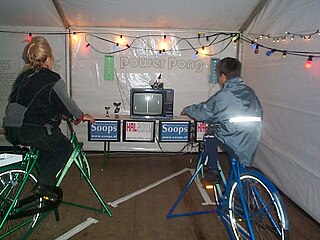
Fitness game, exergame, and gamercise are terms used for video games that are also a form of exercise. Fitness games rely on technology that tracks body movement or reaction. The genre has been used to challenge the stereotype of gaming as a sedentary activity, and promoting an active lifestyle among gamers. Fitness games are seen as evolving from technology aimed at making exercise more fun.
The ThighMaster is an exercise product designed to shape one's thighs.
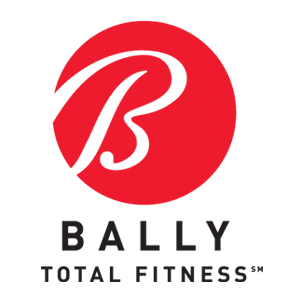
Bally Total Fitness was an American fitness club chain. At its 2007 peak, prior to the filing of the first of two Chapter 11 bankruptcies, Bally operated nearly 440 facilities located in 29 U.S. states, Mexico, Canada, South Korea, China, and the Caribbean under the Bally Total Fitness, Crunch Fitness, Gorilla Sports, Pinnacle Fitness, Bally Sports Clubs, and Sports Clubs of Canada brands.
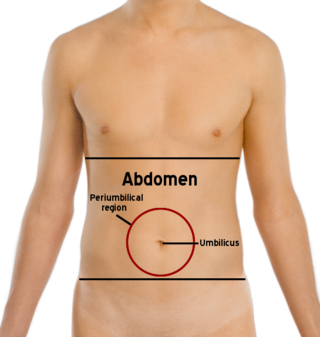
The abdomen is the part of the body between the thorax (chest) and pelvis, in humans and in other vertebrates. The abdomen is the front part of the abdominal segment of the torso. The area occupied by the abdomen is called the abdominal cavity. In arthropods, it is the posterior tagma of the body; it follows the thorax or cephalothorax.

Donald D. Lapre was an American multi-level marketing and infomercial salesman. His work involved product packages such as "The Greatest Vitamin in the World" and "Making Money Secrets".
Abdominal exercises are a type of strength exercise that affect the abdominal muscles. Human abdominal consist of four muscles which are the rectus abdomens, internal oblique, external oblique, and transversus abdominis. When performing abdominal exercises it is important to understand the effects, functions, the types of exercises, and think about how to perform this exercise safely.
Didi Seven is a stain remover that has been heavily advertised in North America For many years, it was manufactured and marketed by Interwood, a Canadian company which acquired rights to the product from a German company.

KAZD is a television station licensed to Lake Dallas, Texas, United States, serving the Dallas–Fort Worth metroplex with a simulcast of Spectrum News 1. Owned by Weigel Broadcasting, KAZD maintains offices on McKinney Avenue in downtown Dallas, and its transmitter is located south of Belt Line Road in Cedar Hill.

Wii Fit is a 2007 exergaming video game designed by Nintendo's Hiroshi Matsunaga for the Wii home video game console, featuring a variety of yoga, strength training, aerobics, and balance mini-games for use with the Wii Balance Board peripheral. Matsunaga described the game as a "way to help get families exercising together". It has since been adopted by various health clubs around the world, and has previously been used for physiotherapy rehabilitation in children and in nursing homes to improve posture in the elderly.
Anthony "Tony" Little is an American television fitness personality and businessman, who is best known for his fitness infomercial products.
Guthy-Renker is a California-based direct-response marketing company that sells health and beauty products directly to consumers through infomercials, television ads, direct mail, telemarketing, e-mail marketing, and the Internet. Many of its products are endorsed by celebrities including actresses and musicians

Offer Shlomi, better known as Vince Offer or Vince Shlomi, is an Israeli-American infomercial pitchman, screenwriter, actor and director. Offer's first major work was the 1999 comedy film The Underground Comedy Movie. He appears in television commercials for his own products including "ShamWow!", an absorbent towel; the "Slap Chop", a kitchen utensil; a lint roller called the "Schticky"; a liquid cleaner called "InVinceable"; and another kitchen utensil called "Crank Chop".

Tae Bo is a body fitness system that incorporates martial arts techniques, such as stances, kicks and punches. It became popular in the 1990s. This fitness system was developed by American taekwondo and karate practitioner Billy Blanks. Such programs use the motions of martial arts at a rapid pace designed to promote fitness.
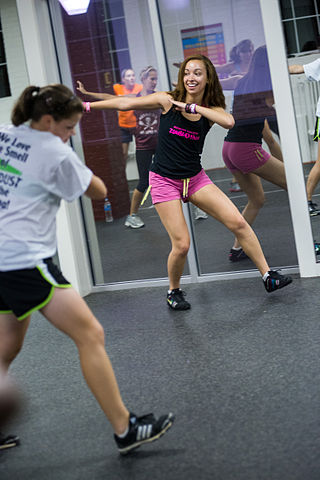
Zumba is a fitness program that involves cardio and Latin-inspired dance. It was founded by Colombian dancer and choreographer Beto Pérez in 2001. It currently has 200,000 locations, with 15 million people taking classes weekly, and is located in 180 countries. Zumba is a trademark owned by Zumba Fitness, LLC.
The Beachbody Company is a publicly traded American fitness and health company based in El Segundo, California. It operates the brands Beachbody On Demand, Team Beachbody, MYXfitness and Openfit. The company also sells dietary supplements such as Shakeology and Beachbar through direct response infomercials and multi-level marketing via independent Team Beachbody "coaches" who serve as sales consultants. In 2023, the company changed its name to BODi.
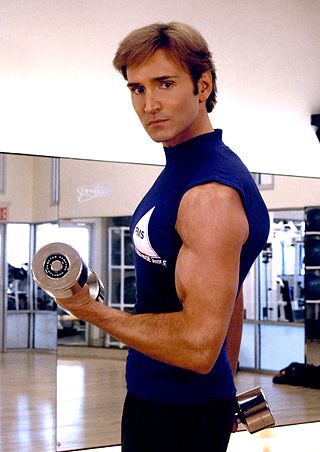
John Basedow is an American television personality, model, author, and motivational speaker. He produces the Fitness Made Simple video series and the Internet series New Media Stew.












